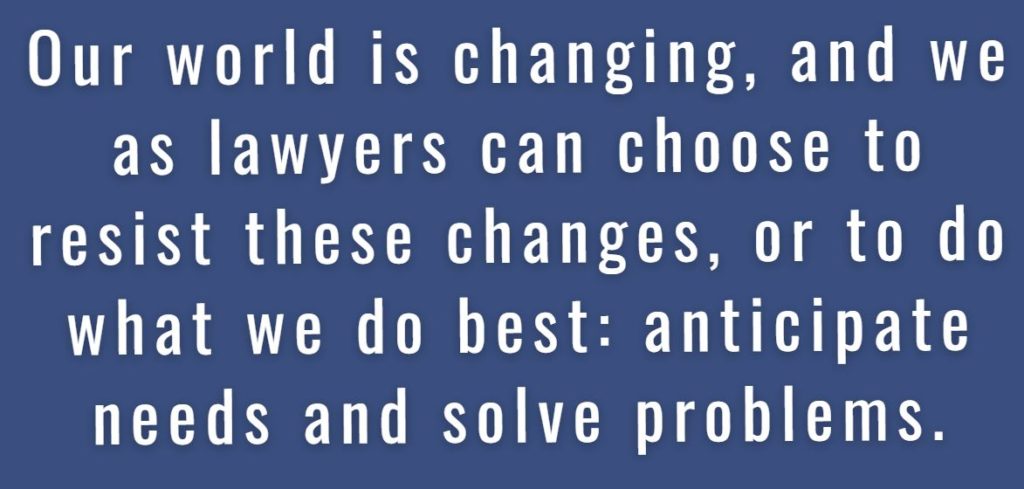To say that we are living in unprecedented times is both an understatement and a cliché appearing in nearly every commercial or corporate message. But, it’s the truth. This year has been one of the murder hornets, earthquakes, civil unrest, and a worldwide pandemic. This year has been one of those moments where we will forever look at life as before and after 2020. It is a time of transition and change both in our own legal community and in our world.

Innovations on the Horizon
As I write this, the deadline has just passed in the comment period on the proposed changes to the regulations allowing for experimentation and innovation in the legal “sandbox.” The Court is now carefully considering each and every comment, including suggestions by the Utah State Bar’s Reform Committee. By the time you read this, new rules will be in effect, with the goal of bridging the gap in access to justice and with the promise of innovation within the legal profession.
As President-Elect last year, I had the unique and, at times, challenging opportunity to participate on both the Court’s committee for Reform and the Bar’s committee, acting as a liaison between the two groups. This allowed me to understand the motivations of the reform implementation committee and to carefully consider the potential benefits and impacts the proposed changes would have on the Bar and Utah’s legal community. These changes are unprecedented, and that very fact was the largest point of criticism in many of the comments on the proposed regulations. Many asked: “Why us?” and “Why must Utah be the guinea pig?” These reactions are normal.
Why Change?
Humans are resistant to change, and humans who also happen to be lawyers are perhaps the most resistant. It stands to reason — we spend our lives streamlining procedures, assessing risk, and solving the problems others didn’t anticipate. Psychological research suggests there may be an additional reason behind lawyers’ resistance to change: Many may have a fixed mindset, instead of a growth mindset. See https://legal.thomsonreuters.com/en/insights/articles/overcoming-lawyers-resistance-to-change.
The article continues: A fixed mindset is a belief that one’s success is based more on inherent intelligence than on effort. According to psychologist Carol Dweck, people with this mindset work toward “performance goals,” a focus on looking smart even if there’s no learning in the process. She explained in Stanford magazine, “For them, each task is a challenge to their self-image, and each setback becomes a personal threat. So, they pursue only activities at which they’re sure to shine – and avoid the sorts of experiences necessary to grow and flourish in any endeavor.” This fosters a fear of failure, and in turn, reluctance to go outside of one’s comfort zone.
Reluctance and Fear
For lawyers, this outlook was reinforced, early on, by a school system that praised intelligence and discouraged risk-taking. It continues with the culture in law firms and legal departments. If tech startups represent one end of the culture spectrum, characterized by a “fail fast, learn faster” environment, the practice of law is on the opposite end, with lawyers unwilling to experiment with different ways to find the right answer.
Resistance to Risk
This fear of failure seems to be the motivating driver for the questions “Why Us?” and “Why not Them first?” I, for one, understand this thinking. As lawyers, we aren’t supposed to fail. We spend our lives fixating on and fixing mistakes and possible mistakes. We hope for the best-case scenario, but plan for the worst. Failure is not an option because it makes us vulnerable, and we are to be invincible. These traits, while incredibly useful in litigation, are not catalysts for innovation, and, to the contrary, often stop us in our tracks.
Why Take Risks?
So, what happens if we make these changes and the results are different than expected, or worse yet, what if we try something, and it fails? The nation is watching, so why put ourselves in this vulnerable position? Certainly, it is safer to maintain the status quo. Renowned professor Brené Brown indicates, “Vulnerability is the birthplace of innovation, creativity and change”; 2012 Ted Talk, Brené Brown, “Listening to Shame.” Still, is it worth the risk?
Lack of Access
In order to answer that question, we need to revisit the impetus for regulatory reform, which is that, despite the earnest efforts of the Court and local attorneys, “[a]ccess to justice in Utah remains a significant and growing problem.” See “Narrowing the Access-to-Justice Gap by Reimagining Regulation,” p. 3. The report cites raw data from the Third District Court for the State of Utah, which shows “at least one party was unrepresented throughout the entirety of the suit in 93% of all civil and family law disputes disposed of in the Third District in 2018.” Id. at page 7.
Let that sink in: In 93% of civil and family law disputes, half of the parties have zero legal guidance or representation, proving that “[t]he idealized picture of an adversarial system in which both parties are represented by competent attorneys who can assert all legitimate claims and defenses is an illusion.” Id. at page 6, citing Civil Justice Initiative, The Landscape of Civil Litigation in State Courts, National Center for State Courts, (last visited Aug. 12, 2019) The Utah State Bar’s Committee on Regulatory Reform agreed that “No one can credibly oppose these aspirational objectives and the wisdom of a controlled environment that with proper oversight, regulation, and reporting, will protect the consumers of these legal services.” See Utah State Bar Committee on Regulatory Reform, Findings and Recommendations, page 4, which were then adopted by the Utah State Board of Bar Commissioners.
Should Utah Take the Lead?
And, while the Bar’s Regulatory committee, and by extension and affirmation, the Board of Bar Commissioners, expressed caution at being “first” just for the sake of being first, the group opined that as long as flexibility and “the ability to alter course” remain, who better to lead than Utah? Id. at page 5. Some fear that by supporting reform, we are dooming our very profession, but the evidence is to the contrary. If the legal needs of the majority are unmet; lawyers are already obsolete.
Responding to a Changing World
After all: “It is not the most intellectual of the species that survives; it is not the strongest that survives, but the species that survives is the one that is able best to adapt and adjust to the changing environment in which it finds itself. Applying this theoretical concept to us as individuals, we can state that the civilization that is able to survive is the one that is able to adapt to the changing physical, social, political, moral, and spiritual environment in which it finds itself.” Leon C. Megginson’s interpretation of Darwin’s Origin of the Species, 1963 June, Southwestern Social Science Quarterly, Volume 44, Number 1, Lessons from Europe for American Business by Leon C. Megginson. Our world is changing, and we as lawyers can choose to resist these changes or to do what we do best: Anticipate needs and solve problems.
A Historical Precedent
I believe if you’ll pardon one last cliché, that Utah’s pioneer roots compel us to be at the forefront of change and to set an example that the rest of the country can follow, but we have to do it together. Utahns have historically come together to solve problems, and we are still doing that to this day in our roles as attorneys dedicated to the common goal of justice for all. Just like the pioneers, we are tired and weary and might be ready to quit, but we will still level our shoulders and push forward, even if we are scared of what lies ahead because that is what pioneers do.


